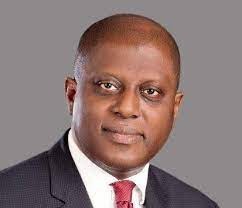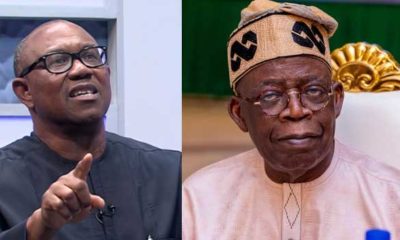Business
Why Naira Is On A Free Fall Against US$

The local currency, the Naira fell to 1005/$ over the weekend in the black market, across major cities in Nigeria, including Lagos, Calabar, Port Harcourt, Kaduna, Kano and Abuja.
And this is in spite of several efforts by the Nigerian Government to control the Foreign Exchange (Forex) Market.
Recall the that Central Bank of Nigeria (CBN), not long ago moved through a memorandum to control the forex market by directing Bureau De Change (BDC) to align rates with what obtained in the Investor & Exporter forex window.
According to the circular number TED/FEM/PUB/FBC/001/007 dated August 17, 2023, titled, ‘Operational mechanism for Bureau De Change operations in Nigeria’, all BDCs and the general public should align buying and selling to the I&E Window.
It read, “The spread on buying and selling by BDC operators shall be within an allowable limit of -2.5 per cent to +2.5 per cent of the Nigerian exchange market window weighted average rate of the previous day.
“Mandatory rendition by BDC operators of the statutory periodic reports (daily, weekly, monthly, quarterly and yearly), on the financial institution forex rendition system which has been upgraded to meet operators’ requirements.”
Biztellers gathered that the CBN has not made good its promise to settle the huge debts to Deposit Money Banks (DMB), which has contributed in putting pressure on demand, by increasing scarcity of forex.
Probably the current leadership changes at the apex bank might have been impacting the situation, as the former acting Governor, Folashodun Shonubi, had on September 6, 2023, assured that the apex bank had concluded negotiation on dollar debts with commercial banks, which offered hopes that all forex backlogs would be cleared “within one to two weeks”.
Despite Shonubi’s position that DMBs had been of much assistance to the apex bank in clearing the major part of its overdue forex forward contracts at maturity, the promise of redemption has not been made good.
This is despite public knowledge that that both parties (regulator and operators) had reached an agreement for reimburse to the DMBs.
Shonubi had volunteered thus, at a public gathering in Lagos, “In response to questions about the backlogs, the banks have been working with the CBN on various structures to clear them. So, what happens is that at maturity, they make the foreign exchange available to those that need it.
“We are discussing with them so we can structure their own. So, we are working towards clearing them in the next one or two weeks. It is something we have been discussing for a while.”
This has continued to mount pressure on the forex situation across the country with DMBs and BDCs yielding to the forces of demand and supply.
The DMBs it was gathered are responding by ‘ducking’ forex demands or at best laying them in abeyance, but the BDCs are focused on buying and selling, which has seen the exchange rates skyrocket.
Feelers from the Abuja based BDC operators, indicate that during the weekend, high demand pushed the Naira to 1,000/$.
A BDD Operator who spoke to Biztellers from Abuja, Izama Otedo, blamed it on scarcity of the US$.
He said, “We are only selling as we buy. We always put little gain. And no one can sell what he doesn’t have.”
He revealed that over the weekend the rate of exchange oscillated between 980/$ to 1005/$ in the Abuja metropolis.
In the same vein, a BDC Operator at the Ikeja Airport, Lagos, Kazeem Oredugba, pointed out that it had become more difficult for forex dealers to source ‘the commodity’, which is affecting the sell-on price.
He told Biztellers, “We are finding it difficult to source the US$ and other foreign currencies. If we don’t see it to buy, we cannot sell. And if you see it we can only buy at any rate knowing what we are going to sell-on at a mark-up.”
Reminded about the directive from the CBN, Oredugba quipped, “If the CBN is issuing a directive, let them back it up with supply of the forex. Nigerians are looking for ways to keep lives and businesses going, and we are meeting their needs by serving as the link between those buying and those selling. No authority can decree that,” he pointed out.
What this portends is that the forex market remains volatile and inflation would likely continue unabated while government struggles to come up with solutions.
Business
Savannah Energy Provides Unaudited FY 2024 Trading Updates

Savannah Energy has shared a trading update on its Nigerian operations and other markets in Africa, including up-to-date cash collections in its Nigerian business.
According to the update, made available on Thursday in Lagos, its gross production in Nigeria averaged 23.1 Kboepd for FY 2024, broadly in line with the prior year’s 23.6 Kboepd, of which 88% was gas (FY 2023: 91%).
On the update, CEO of Savannah Energy, Andrew Knott, said, “I am pleased to provide a FY trading update which demonstrates the continued progress we have made in 2024, a year which saw the highest level of cash collections ever recorded by our Nigerian business. 2025 is expected to be an exciting year for our Company: we have a large planned operational programme in Nigeria which is anticipated to enhance both our oil and gas production levels and capacity; we intend to progress our R3 East oil development project in Niger; we continue to pursue key acquisitions in the upstream oil and gas space; and we continue to seek to build our power business.
“Fundamentally, Savannah remains unequivocally an “AND” company, seeking to deliver strong performance both for the short AND long term across multiple fronts, and pursuing growth opportunities in both the hydrocarbon AND power sectors.”
The update It also shows that it generated a Total Income of US$393.6 million in 2024, compared to FY 2023’s US$289.8 million. This consists of Total Revenues of US$258.7 million and Other operating income of US$134.9 million.
The report also shows that Savannah’s FY 2024 Total Revenues were ahead of the previously issued financial guidance of greater than US$245 million, while FY 2024 financial guidance is reiterated for Operating expenses plus administrative expenses at ‘up to US$75 million’. The company expects its FY 2024 capital expenditure to come in lower than planned (previously guided at ‘up to US$50 million’) due to the phasing of spend.
ALSO READ: CSR: Dangote Awards Scholarships To 473 Students
According to the update, Savannah’s cash collections in 2024 amounted to US$248.5 million, a slight increase from the US$206 million it received in 2023. The report further shows that its cash balances as at 31 December 2024 stood at US$32.6 million, compared to the 31 December 2023 figure of US$107.0 million.
The report shows that the company’s midstream subsidiary, Accugas Limited, had as at 31 December 2024 drawn down on its NGN332 billion of the NGN Transitional Facility, with the resulting funds being converted to US$, which, along with cash held, was used to partially prepay the existing Accugas US$ Facility, leaving a balance as at 31 December 2024 of approximately US$212.3 million.
The report also provided new updates on Accugas’ US$45 million Uquo Central Processing Facility (“Uquo CPF”) compression project in Nigeria, noting that its commissioning which will enable the expansion of gas production in the medium term is well underway.
The report highlighted the progress being made in the procurement process of long lead equipment in Nigeria for a potential two-well drilling campaign on the Uquo Field in H2 2025, with an additional gas development well expected to add up to 80 MMscfpd of supplemental production capacity and a potential exploration well targeting an Unrisked Gross gas initially in place (“GIIP”) of 154 Bscf (25.7 MMboe) of incremental gas resources.
The update shows that progress is also being made in the planned Savannah acquisition of Sinopec International Petroleum Exploration and Production Company Nigeria Limited, whose principal asset is a 49% non-operated interest in the Stubb Creek oil and gas field (“Stubb Creek”), with regulatory approval and completion being targeted in Q1 2025. Following the completion of the acquisition, Savannah intends to commence an expansion programme which is anticipated to increase Stubb Creek gross production from an average of 2.7 Kbopd in 2024 to approximately 4.7 Kbopd.
In Niger, Savannah continues to seek to progress its 35 MMstb (Gross 2C Resources) R3 East oil development in South-East Niger, while it continues to push for a potential alternative transaction structure to acquire a material stake in producing oil and gas assets in South Sudan as previously announced on 20 December 2024.
On the renewable energy front, the update shows that Savannah has up to 696 MW of renewable energy projects currently in motion, including the up to 250 MW Parc Eolien de la Tarka wind farm project in Niger and the up to 95 MW Bini a Warak hybrid hydroelectric and solar project in Cameroon. A firm believer in Africa’s transition to renewable energy, Savannah continues to target a portfolio of up to 2 GW+ of power projects in motion by the end of 2026.
Business
Nigeria Can Achieve 5.5% GDP Growth – NESG
The Nigerian Economic Summit Group (NESG) has projected that the country has the potential to achieve a 5.5% growth in Gross Domestic Product (GDP) if critical policy reforms are sustained.
This was disclosed on Thursday during the launch of the NESG’s 2025 Macroeconomic Outlook report.
Speaking at the event, the Chief Economist and Director of Research & Development at NESG, Dr. Olusegun Omisakin, highlighted the need for more efficient policy implementation to unlock Nigeria’s economic potential.
READ MORE: Davido Is Richer Than His Billionaire Father – Ibrahim Chatta Claims
“We believe at the optimal level, if we embark on more efficient policy reforms, the Nigerian economy has the potential, the GDP to end up at 5.5 per cent, and we believe that this is achievable,” Omisakin stated.
More to follow……….
Business
CBN Approves Release Of Nigerian FX Code
The Central Bank of Nigeria (CBN) has announced the release of the Nigerian Foreign Exchange (FX) Code, a set of guidelines designed to promote ethical conduct among authorized dealers in the country’s FX market.
In a statement, the apex bank disclosed that the official launch of the Code would take place on Tuesday, January 28, 2025, at the CBN Head Office Auditorium in Abuja.
READ MORE: Dangote Denies Culpability In Pumping Up Petrol Price
“The Central Bank of Nigeria has approved the release of the Nigerian Foreign Exchange (FX) Code as a guideline to the banking industry to promote the ethical conduct of authorised dealers in the Nigerian Foreign Exchange Market,” the statement read.
The introduction of the FX Code is expected to enhance transparency, accountability, and professionalism within Nigeria’s foreign exchange ecosystem, aligning it with global best practices.
The event is anticipated to attract key stakeholders in the financial and banking sectors, as well as representatives from authorized FX-dealing institutions across the country.
























